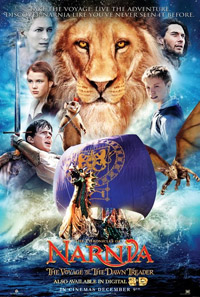The Dawn Treader and the Threshold of Awesome
 My buddy Ty and I went to see The Voyage of the Dawn Treader on Friday. It has been a very, very long time since I read the book by C.S. Lewis so I can't speak to how true this film is to the original source material. What I can say is that I had a really good time at the movie, and this film comes in at #11 for me this year.
My buddy Ty and I went to see The Voyage of the Dawn Treader on Friday. It has been a very, very long time since I read the book by C.S. Lewis so I can't speak to how true this film is to the original source material. What I can say is that I had a really good time at the movie, and this film comes in at #11 for me this year.
As of this writing, that puts Dawn Treader just below Iron Man 2, which is in turn just below what I call my "Threshold of Awesome." This means that both of these films were almost as good as the movies that had me cheering in the theater, exulting in the cinematic experience, and basically relishing the opportunity I had to spend money to see them. It doesn't mean that this trip to Narnia disappointed me, but if you're looking for a family movie this weekend I'd probably choose to point you at Tangled instead.
My favorite part of the movie was my least favorite part of the book: Eustace. Will Poulter's performance was spot-on. He brought this character to life perfectly. We love to hate Eustace, we yearn to pity him, and his transformation really is the heart of the story.
My NEXT favorite part was how the movie spent a lot less time on the boat than I remember from the book. There's plenty of adventure, and not very much sitting around becalmed wondering whether you're going to fall off the edge of the world.
And now, a personal, religious note. I was maybe 10 years old when I read The Chronicles of Narnia. I remember feeling, at that time, like Aslan was a much more present deity than the God I was ostensibly worshiping in church. I also recall feeling like that was not the way things should be. Over the next several years I spent more time reading scriptures, and Jesus Christ became, for me, a stronger influence than he'd been before. Which is, at least to my belief, a good thing. The best thing, even.
I bring this up, because while I recognize much of the Christian symbolism in the Narnia books, I don't remember Voyage of the Dawn Treader explicitly calling out an in-world connection. [EDIT: commenters below have corrected my faulty memory. Thanks!]
SPOILER ALERT
In this film adaptation, Aslan and Lucy have a conversation which does explicitly call out that connection. Lucy asks if Aslan will be watching over her when she returns to our world. Aslan says, and I paraphrase, "I have another name in your world. You must come to know me there."
I'm still not sure how I feel about that. I think it was masterfully handled, but I also think that our fantasy worlds do a better job of teaching us about our own when they are subtle.


